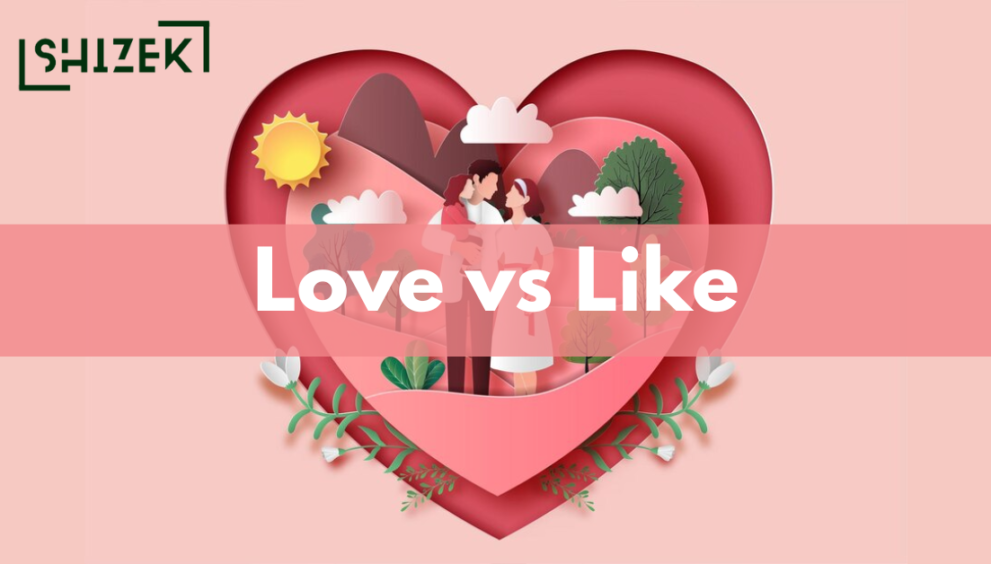Difference Between Love and Like

The key difference between love and like is that love involves deep, long-lasting emotional commitment and willingness to sacrifice, whereas like is a milder, often temporary affection based on admiration and enjoyment. Love impacts significant life decisions, while like generally affects day-to-day interactions.
Love and like are two distinct emotions often confused with each other. This article explores the differences between them, highlighting how they influence our relationships and interactions. Understand the reasons behind love and like, and learn how to distinguish between these powerful feelings.
Table of Content
- What is the difference between love and like?
- What is love?
- What is like?
- Key Similarities and Differences Between Love and Like
What is the difference between love and like
| Parameter | Love | Like |
| Depth of Feeling | Deep, intense emotional connection | Mild, often temporary affection |
| Commitment Level | High, often involves long-term commitment | Low, can be fleeting or situational |
| Dependency | High emotional dependency | Low to moderate emotional involvement |
| Sacrifice | Willing to make significant sacrifices | Limited willingness to make sacrifices |
| Duration | Usually long-lasting | Often short-term or situational |
| Physical Attraction | Can exist without physical attraction | Often involves physical attraction |
| Emotional Intensity | Intense emotional highs and lows | Generally stable, less intense emotions |
| Focus | Focused on the other person’s well-being | More self-focused, based on own feelings |
| Trust | High level of trust and security | Moderate trust, less security |
| Impact | Significant impact on life decisions | Minor impact on day-to-day decisions |
What is Love?
Love is a profound and enduring emotional bond that often involves deep affection, care, and commitment towards another person. It goes beyond superficial attraction and involves a genuine concern for the well-being and happiness of the loved one.
Reasons Why People Love
- Emotional Connection: A deep bond formed through shared experiences and emotions.
- Commitment: A willingness to invest time and effort into the relationship.
- Trust: A high level of trust and security in the relationship.
- Sacrifice: The readiness to make significant sacrifices for the loved one’s happiness.
- Empathy: A strong sense of empathy and understanding towards the loved one.
- Respect: Mutual respect and admiration.
- Shared Goals: Common life goals and values.
- Unconditional Support: Providing unwavering support through good times and bad.
- Intimacy: Deep physical and emotional intimacy.
- Mutual Growth: Encouraging each other’s personal growth and development.
How People Love
- Communication: Open and honest communication to build trust and understanding.
- Quality Time: Spending meaningful time together.
- Acts of Kindness: Small gestures that show care and appreciation.
- Physical Affection: Hugging, kissing, and other forms of physical touch.
- Support: Being there for each other during tough times.
- Respect: Valuing each other’s opinions and boundaries.
- Compromise: Finding middle ground in disagreements.
- Shared Experiences: Creating memories and enjoying activities together.
What is Like?
Like is a feeling of affection or enjoyment towards someone or something. It is often based on superficial qualities and can be temporary. Unlike love, liking someone does not necessarily involve deep emotional investment or long-term commitment.
Reasons Why People Like Each Other
- Physical Attraction: Initial attraction based on appearance.
- Shared Interests: Enjoying similar activities or hobbies.
- Pleasant Interactions: Positive and enjoyable interactions.
- Admiration: Respect for certain qualities or achievements.
- Compatibility: Similar personality traits or lifestyles.
- Convenience: Proximity or ease of interaction.
- Humor: Enjoying each other’s sense of humor.
- Friendship: Developing a bond through casual interactions.
- Approval: Liking someone because they fit into social norms or expectations.
- Temporary Connection: Short-term feelings due to a specific situation or environment.
How People Like Each Other
- Compliments: Giving and receiving compliments.
- Shared Activities: Participating in activities together.
- Positive Interactions: Having enjoyable conversations.
- Admiration: Expressing admiration for specific traits.
- Casual Affection: Light physical touch like hugging or patting.
- Socializing: Spending time together in social settings.
- Friendly Gestures: Acts of kindness that are not deeply sacrificial.
- Proximity: Being around each other frequently.
Key Similarities and Differences Between Love and Like
- Both involve positive feelings towards another person.
- Can enhance personal happiness.
- Often include admiration and respect.
- Involve spending time together.
- Can lead to deeper connections.
- Love is deeper and more intense than like.
- Love involves a higher level of commitment.
- Love tends to be long-lasting; like can be temporary.
- Love involves greater willingness to sacrifice.
- Love has a significant impact on life decisions, whereas like does not.
- Love requires a higher level of trust.
























































































































